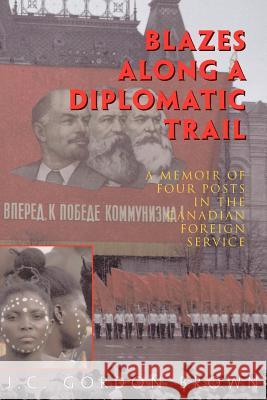Blazes Along a Diplomatic Trail » książka
Blazes Along a Diplomatic Trail
ISBN-13: 9781552125243 / Angielski / Miękka / 2000 / 328 str.
BLAZES is divided into four parts.
The first part deals with South Africa where the author was the deputy to the High Commissioner from 1958 to 1962. The country's troubled race relations were already under scrutiny in the United Nations and pressure was mounting at home and abroad for reform. All this was resented and resisted by the governing minority of the population represented by the National Party which was supported by most of the Afrikaans-speaking majority of the South African white population. Black African resistance led to the major protests of March 1960 which were suppressed with bloodshed at Sharpeville and led to measures that ended any pretence of democracy in South Africa. Sharpeville resulted in the withdrawal of South Africa from the Commonwealth and set the stage for the events of succeeding decades which eventually resulted in the establishment of a non-racial government under Nelson Mandela in 1991.
The second part concerns the Soviet Union where Brown was deputy to the Ambassador, Robert Ford, for a brief 16 months from mid-1964. Ford was a foreign service icon whose career had been marked by bad luck: he had been stationed in Moscow but absent on holidays during all the important Soviet events of the fifties and sixties. That included the coup d'etat when Nikita Khruschchev was removed from power and the author was in charge of the embassy. The Russian experience was rich and demanding -- and rewarding, for it lead to his first ambassadorial posting.
Part three deals with the Congo plus much of central Africa including Zambia, Malawi, Rwanda, Burundi, and Congo-Brazzaville: a lot of the dark continent that proved even in that time how dark it couldbe. Within weeks of Brown's arrival, he had experienced a dramatic coup in the Congo and found himself in charge of the airlift of oil and gasoline to Zambia occasioned by Rhodesia's unilateral declaration of independence. There was much more ahead as the crisis of Canadian unity led to confrontations in Africa between Canada, on the one side, and France and Quebec on the other.
Part four is about Cyprus, divided between Greek and Turk for centuries and kept in peace by the United Nations Force -- nonetheless a civilized piece of cake after the Congo. Canada was one of the major contributors of peacekeepers on the island. Then we blew it, closing our diplomatic mission, and abdicating an honourable role in a situation that lingers on. That was the 1968-1970 farewell to the decade of "Blazes."
Since those days in South Africa, Russia, the Congo and Cyprus, none of the countries can be said to have solved all of the problems that faced them then. Instability concerns all, making Blazes Along a Diplomatic Trail of contemporary relevance.











